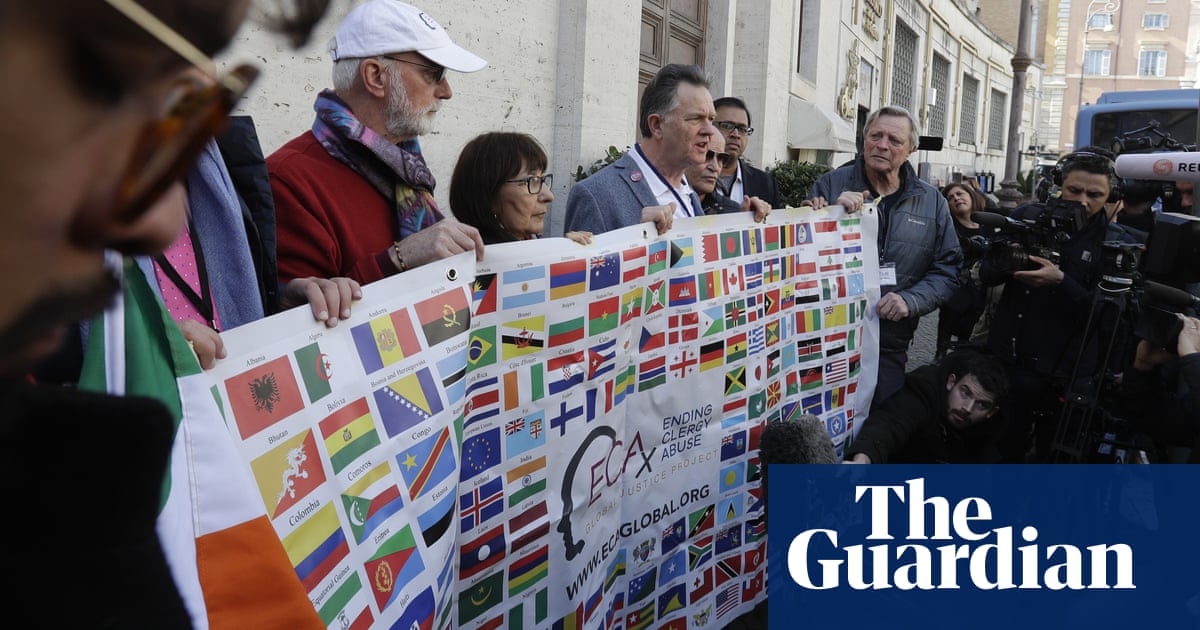In 2002, the Boston Globe published aseries of articlesexposing the scale of child sexual abuse in the local Catholic church. It shone a spotlight – the title of a latermovie based on the investigation– on the church’s dark shameful secrets.
Eleven years later, Francis became pope. Wave after wave of abuse revelations continued to crash at the Vatican’s doors amid mounting anger and revulsion among the faithful and beyond. The issue threatened to derail Francis’s papacy and dominate his trips abroad. He was slow to grasp the scale and systemic nature of the issue and apparently reluctant to take firm action to deal with abusers and those who covered up abuse.
Within hours of Francis’s death on Monday, survivors of clerical sexual abuse sounded a discordant note amid the lavish tributes. They said the pope failed to fundamentally change the culture of deference that allowed abusers to flourish and failed to deliver decisive action. It was the “tragedy of his papacy”, said one organisation.
Among the scandals that erupted in the first half of Francis’s papacy were a damning report on thesexual abuse of potentially thousands of children by priests in Pennsylvaniaand the subsequent cover-up by the church; theresignationas a cardinal (and laterdefrocking) of Theodore McCarrick, a former archbishop of Washington, over alleged sexual assaults; apolice raid on the Catholic church’s HQ in Chile; and theconviction of an Australian archbishopof covering up child abuse.
In 2018, George Pell, a cardinal and ally of Pope Francis, became the highest ranking Catholic to be convicted of child sexual abuse. He spent a year in prison in Australia before hisconvictions were overturnedin 2020.He died in 2023.
In another crushing blow, a French archbishop and cardinal, Philippe Barbarin, wasfound guilty of covering up child sexual abusein 2019. He was lateracquitted on appeal.
In Chile, Francis defended a bishop, Juan Barros, who had been accused of being an accomplice of that country’s most notorious pedophile priest, Fernando Karadima. Francis only changed his stance after adisastrous trip to Chilein January 2018. Headmitted “grave errors” in judgment, and summoned all the Chilean bishops to Rome andreceiving their resignations en masse.
Later that year, Pope Francis’stwo-day trip to Ireland, once a devoutly Catholic country, was dominated by protests by abuse survivors who demanded that the pontiff take responsibility for the church’s failures. Francis made repeated pleas for forgiveness at public events.
As his trip came to an end, archbishop Carlo Maria Viganò, a retired Vatican diplomat,demanded Francis’s resignation, claiming he had failed to act on abuse allegations against a prominent figure in the church hierarchy.
After the Pennsylvania report, Francis issued a 2,000-word letter to members of the global church. It spoke of sorrow and shame at atrocities committed by priests, and begged for forgiveness.
The following year, hesummoned bishops from around the world to Romefor a summit on clerical sexual abuse. He told them survivors deserved “concrete and efficient measures”, not mere condemnations.
That was followed by a decree that all Catholic priests and nunsmust report sexual abuse and its cover-upto church authorities – although not to police.
But for survivors it was too little, too late.
Ending Clergy Abuse (ECA) said after Francis’s death on Monday that his papacy “fell short of delivering the decisive action needed”.
Its statement added: “Words without action ring hollow. Under [Francis’s] leadership, the church failed to hold bishops accountable for their roles in enabling, concealing, and perpetuating abuse. Systemic change remained elusive.
“The resignation of a few prelates behind closed doors is no substitute for public accountability. His refusal to remove or discipline those complicit in cover-ups betrayed the church’s moral obligation to protect the vulnerable.”
Snap, the Survivors’ Network of those Abused by Priests, said victims and survivors were mourning the “tragedy of [Francis’s] papacy” – children and vulnerable adults who were abused during his tenure.
Shaun Dougherty, Snap’s president, said: “The bishops of the world–including the 137 cardinals who will choose the next pope–collectively possess knowledge of thousands of abusive priests still serving in parishes and schools. A true zero-tolerance policy would mean removing these offenders immediately and holding bishops accountable for keeping them in ministry.”
Anne Barrett Doyle, co-director of the US-based group BishopAccountability, said Francis had “supreme power” but “refused to make the necessary changes”.
Mitchell Garabedian, a Boston lawyer representing hundreds of abuse survivors, told the BBC: “There really hasn’t been any substantive change within the Catholic church. There hasn’t been any transparency.Pope Francissaid the right things, he meant the right thing, but the bureaucracy just shut him down.”
There have been fewer scandals and revelations in recent years, but the fury and pain of survivors is undiminished and the repercussions for the church continue to reverberate.
Members of the conclave that will meet in the coming days to choose a successor to Francis will know survivors will be watching closely.
“The next pope must act where Pope Francis did not,” said ECA. “He must implement a universal zero-tolerance policy–one that holds clergy fully accountable for abuse and its concealment. He must reject secrecy and complicity and place the protection of children and vulnerable adults at the heart of the church’s mission.”
Dougherty said: “We cannot afford another papacy that makes promises but fails to deliver real protection for children and justice for survivors.”
